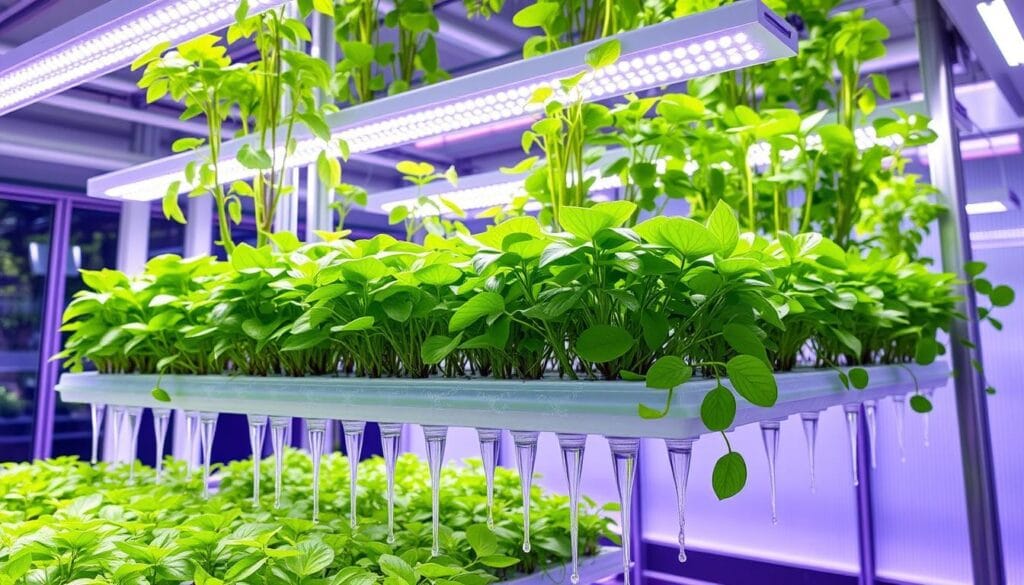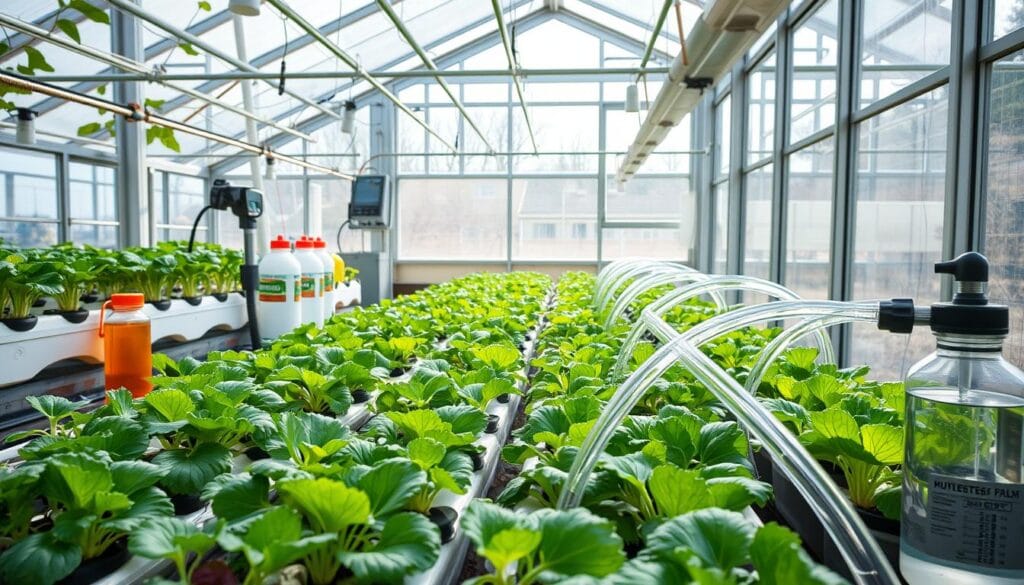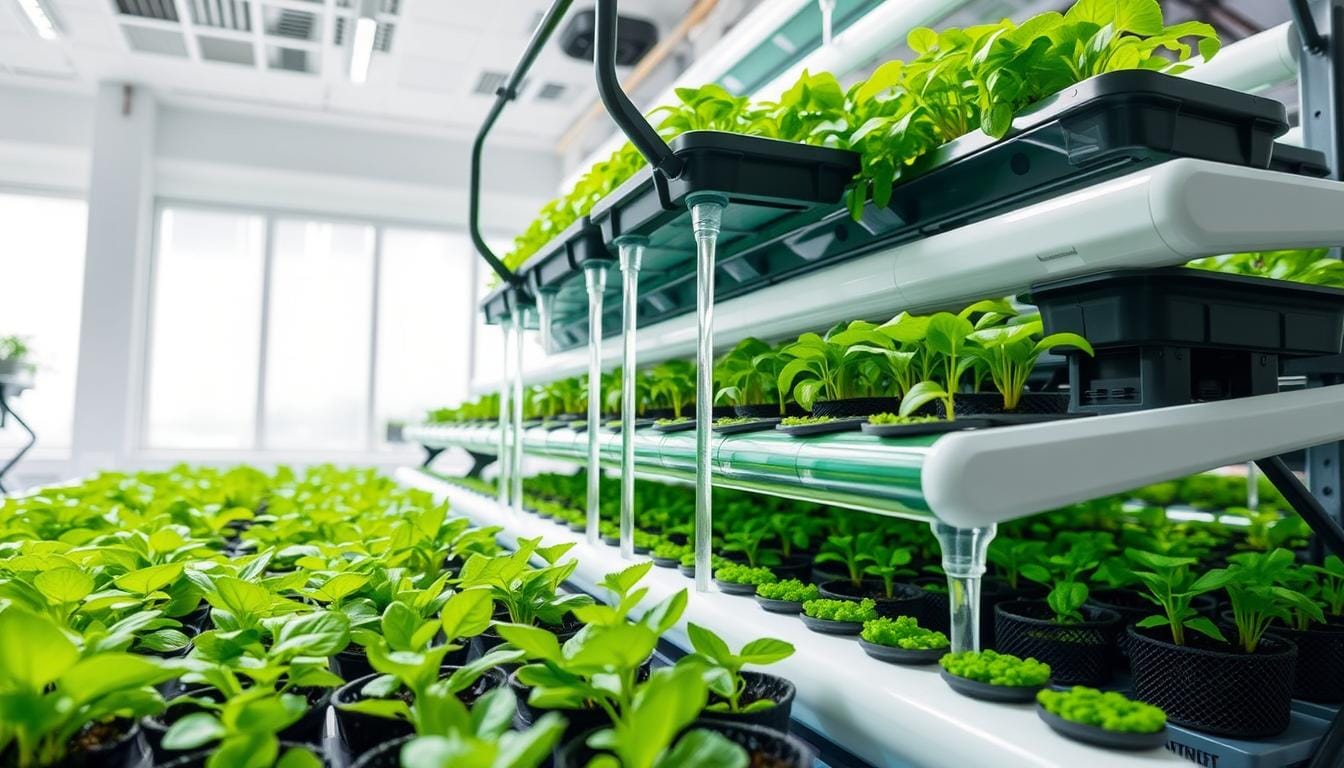The NFT Hydroponic System has completely transformed the way I grow herbs and veggies at home. Traditional gardening can be a lot of work, but with NFT hydroponics, it’s a whole new level of efficiency. This method has made gardening simpler and more productive, and I believe it can do the same for you.
Key Takeaways
- NFT hydroponic kits range from $75 to $500, catering to various budgets.
- NFT systems can be set up in as little as 30 minutes, minimizing assembly time.
- Complete NFT kits are designed to cultivate 1-2 plants, maximizing yields in compact spaces.
- Reservoir maintenance in NFT systems typically takes only 20 minutes.
- NFT kits offer flexible sizes and configurations to suit your unique growing needs.
Understanding Hydroponic Growing Systems
Hydroponic systems grow plants without soil. They use nutrient-rich water to nourish the plants. These systems range from simple to complex, leading to big changes in growing plants indoors.
Basic Principles of Soilless Cultivation
Hydroponic systems don’t need soil. They give plants nutrients directly through their roots. This method helps plants grow better, produce more, and use resources wisely.
Evolution of Hydroponic Technology
Hydroponic technology has grown a lot over time. It started with simple water-based systems and now includes advanced methods like Nutrient Film Technique (NFT). These new ways of growing plants have changed farming, making it more efficient and sustainable.
Modern Applications in Agriculture
Hydroponic technology is used in many ways in farming. Soilless cultivation is key in vertical farming, where plants grow in layers. It’s also used in urban areas for growing fresh food. These methods are making farming more sustainable and efficient.
“Hydroponic systems offer unparalleled opportunities for precision farming, enabling us to cultivate crops with unprecedented efficiency and sustainability.”
| Advantages of Hydroponic Systems | Disadvantages of Hydroponic Systems |
|---|---|
|
|
NFT (Nutrient Film Technique) System: A Comprehensive Overview
The Nutrient Film Technique (NFT) is a game-changer in hydroponic gardening. It keeps a thin layer of nutrient-rich solution over plant roots. This ensures plants get water, nutrients, and oxygen constantly.
NFT systems are great at getting nutrients to plants quickly. This leads to fast growth and plenty of harvests. It’s perfect for growing fast crops like lettuce and herbs.
NFT systems come in all sizes, from small home setups to big commercial ones. This means you can grow plants without soil in any space.
The Hydroponics growing tower using NFT can double your yield. It uses less water and space than traditional soil gardening. The VIVOSUN Hydroponics Growing System has 90 plant sites over 3 layers, making gardening efficient.
If you love gardening or want to try something new, NFT is a great choice. It lets you grow plants in a new, soil-free way. Discover the future of growing plants with the Nutrient Film Technique.
Key Components of NFT Hydroponic Systems
Exploring hydroponic gardening can be a big change. The Nutrient Film Technique (NFT) system is a top pick. It has key parts that work together to give your plants the best growing spot.
Essential Hardware Requirements
The heart of an NFT system is the growing channels. These are where your plants will grow well. They’re made of strong, safe materials and slope a bit to keep the nutrient solution moving.
Next, there’s the nutrient reservoir. It holds the nutrients and minerals your plants need. You also need a pump to keep the solution flowing and air stones for oxygen.
Nutrient Solution Management
Keeping the nutrient solution balanced is key for your plants’ health. The solution’s pH should be between 5.5 and 6.5 for best nutrient uptake. Checking and adjusting the solution’s electrical conductivity (EC) ensures your plants get the right minerals.
Environmental Control Systems
Environmental control is also vital for NFT hydroponic gardening. Managing temperature, humidity, and light levels greatly affects plant growth. Using climate control systems and LED grow lights helps create the perfect environment for your plants.
Knowing the key parts of an NFT hydroponic system lets you fully use its benefits. Whether you’re experienced or new, understanding these elements will help you grow a lot and enjoy gardening.
Space-Efficient Design and Vertical Growing Capabilities
NFT (Nutrient Film Technique) hydroponic systems are great at saving space. They let you stack growing channels vertically. This design fits more plants in less space, perfect for cities or indoor growing.
Vertical NFT setups can support up to 16 plants per square foot. That’s a lot more than the 1-2 plants soil-based farming can handle. This is key for feeding more people in cities where land is hard to find.
These systems also save water and nutrients. They recycle the nutrient solution, cutting down on waste. Adding IoT and AI lets farmers monitor and improve their crops in real-time.
By using vertical space, NFT hydroponics are a smart choice for city farming. They let you grow a lot of food in small places like warehouses. This method could lead to more food, better use of resources, and meet the needs of a growing world.
“Vertical NFT systems can stack multiple layers of channels, maximizing space utilization in urban environments where land is scarce.”
Water Conservation and Resource Management
Nutrient Film Technique (NFT) hydroponic systems are known for saving a lot of water. They use a closed-loop design to recycle and reuse up to 90% of water. This makes them much better than traditional farming when it comes to water use.
This method not only helps the environment but also saves water. It’s a significant step towards making farming more sustainable.
Water Recycling Benefits
The secret to NFT’s water saving is its continuous water recycling. Plants take in nutrients, and the leftover solution is cleaned and put back into the system. This way, very little water is wasted.
This closed-loop system makes sure water is used wisely. It helps reduce the harm to the environment.
Nutrient Solution Optimization
Ensuring the correct balance of nutrients in the solution is essential for optimal plant growth. NFT systems can adjust nutrient levels to match what plants need. This prevents waste and keeps plants healthy.
This control helps make NFT hydroponics more efficient and sustainable. It’s a big part of why NFT is good for the planet.
Environmental Impact Reduction
NFT hydroponics greatly reduce water use and waste. This makes them a big help in reducing the environmental impact of farming. They use less water and manage nutrients better, making farming more sustainable.
These systems are important for the future of farming. They help deal with water scarcity and protect the environment.
“Hydroponic systems can boost crop growth and yield rates by up to 50% compared to traditional farming methods, while requiring only 10% of the water typically used in conventional agriculture.”
| Key Benefit | Hydroponics Impact |
|---|---|
| Water Conservation | Up to 90% reduction in water consumption compared to soil-based agriculture |
| Nutrient Optimization | Precise control over nutrient levels, minimizing waste and runoff |
| Environmental Sustainability | Reduced water footprint and lower carbon emissions, promoting eco-friendly food production |
Maximizing Crop Yields with NFT Systems
The Nutrient Film Technique (NFT) system is a game-changer for growing crops. It uses high-yield hydroponics to boost plant growth. This leads to more harvests and better quality produce.
Plants in NFT systems get plenty of oxygen from the flowing water. This helps their roots grow strong. Plus, the constant flow of nutrients keeps plants healthy and thriving.
NFT systems are also good for the planet. They use a closed-loop design to recycle water, cutting down on waste. This saves money for growers and helps the environment.
But, NFT systems need careful attention. Clogs can happen if the water isn’t filtered right or if it moves too slow. It’s important to check the water’s pH and nutrient levels often to keep plants healthy.
| NFT System Benefits | Potential Challenges |
|---|---|
|
|
NFT systems help growers get the most out of their crops. They make it possible to have big harvests and make more money. This is thanks to the power of high-yield hydroponics and efficient plant growth.

Plant Health and Root Development Benefits
Hydroponic systems, especially the Nutrient Film Technique (NFT), are great for plant health and root growth. They create a perfect spot for roots to grow, giving them constant access to nutrients and oxygen. This results in stronger and more expansive root systems.
Optimal Root Zone Environment
NFT systems don’t use soil, which means no soil-borne diseases or pests. This lets plants grow without worrying about these problems. The controlled environment also helps manage pH and nutrients, ensuring plants get what they need for healthy growth.
Disease Prevention Advantages
NFT systems are closed, making it hard for diseases and pests to get in. This controlled space helps growers keep things clean and avoid using harsh chemicals. It’s a greener way to grow plants.
Growth Rate Enhancement
Plants grown in NFT systems grow faster than those in soil. They get nutrients and oxygen all the time, without competition from soil. This means plants can grow quicker and produce more, leading to faster harvests and better use of resources.
“NFT systems create an ideal environment for healthy root growth, fostering stronger and more productive plants.”
Using NFT hydroponic systems, growers can raise healthier, faster-growing plants. This boosts the efficiency and productivity of their work.
Commercial Applications and Scalability
The Nutrient Film Technique (NFT) hydroponic system is versatile and scalable. It’s ideal for both small-scale and large-scale operations. Its efficiency and consistency make it perfect for businesses wanting year-round production.
NFT systems are common in large lettuce and herb production. They’re also used in research and urban vertical farms. The system’s ability to grow with demand is a big plus.
Not just for leafy greens, NFT systems grow many commercial hydroponics crops. This includes tomatoes, cucumbers, and peppers. Its design is perfect for saving space, ideal for urban and industrial NFT use.
Other hydroponic methods like Deep Water Culture (DWC), Aeroponics, and Ebb and Flow are used too. Each has its own benefits and fits different crops and environments.
For commercial hydroponics growth, Kryzen Biotech provides full support. Their team helps design, install, and maintain scalable growing systems and industrial NFT setups. They aim for commercial success.
Whether you’re a small urban farmer or a big commercial grower, NFT systems are a great choice. They offer versatility and scalability for your commercial hydroponics needs. By using the latest industrial NFT tech, you can boost efficiency and profits.
Maintenance and System Management
Keeping your NFT hydroponic system in top shape is key for great crops and healthy plants. It’s all about regular checks and quick fixes to avoid problems.
Regular Monitoring Procedures
Watch the important parts of your NFT system closely. This includes:
- pH levels of the nutrient solution
- Electrical conductivity (EC) to ensure proper nutrient concentration
- Temperature of the nutrient solution and growing environment
Testing and adjusting these factors often helps your plants grow well. It stops problems like too much or too little nutrients and root rot.
Troubleshooting Common Issues
When your system has problems, know how to fix them. Common issues include:
- Pump failures: Check for clogs, power supply, and proper functioning of the pump.
- Clogged channels: Clean the hydroponic channels regularly to prevent buildup of debris and algae.
- Nutrient imbalances: Carefully monitor and adjust the nutrient solution’s composition to meet the plants’ changing needs.
Quickly finding and fixing these problems keeps your NFT hydroponic system healthy and productive.
System Optimization Tips
To make your NFT system even better, try these tips:
- Proper plant spacing: Make sure plants have enough room for roots and air.
- Channel cleanliness: Clean and sterilize channels often to stop algae and contaminants.
- Nutrient adjustment: Adjust the nutrient solution as plants grow and change.
Using these maintenance and optimization tips will make your NFT hydroponic system work its best. You’ll get lots of healthy crops.

Cost Analysis and Return on Investment
Hydroponic farming starts with a higher cost for NFT systems than soil-based farming. Yet, these systems save money over time and offer a good return on investment (ROI).
The cost of setting up an NFT hydroponic system can range from $500 for small setups to over $100,000 for larger installations. The initial cost is high, but these systems save money in the long run. They need less land, water, and labor, cutting down on operational costs.
For example, hydroponics use up to 98% less water than traditional farming. Nutrient solutions can cost up to $1,000 a year. Electricity for the system can add up to $5,000 annually for medium-sized operations. These savings, along with higher crop yields and premium prices, can pay off in 1-3 years. The cost varies depending on the size of your operation and the types of crops you cultivate.
| Cost Factor | Traditional Farming | NFT Hydroponic System |
|---|---|---|
| Land Acquisition | Costly, as it requires land purchase and preparation | Minimal land requirements, allowing for vertical farming and space-efficient designs |
| Water Consumption | High water usage for irrigation | Up to 98% less water consumption through recirculation and efficient nutrient management |
| Nutrient Management | Ongoing costs for soil amendments and fertilizers | Reduced nutrient costs, as the same solution can be recirculated and optimized |
| Crop Yield | Dependent on seasonal changes and environmental factors | Increased crop yields and faster growth cycles, leading to higher productivity |
| Produce Quality | May not meet the highest quality standards | Hydroponically grown produce often commands premium pricing due to superior quality |
By looking at the long-term benefits of NFT hydroponic systems, you can start a sustainable and profitable farm. This aligns with hydroponic ROI, NFT system costs, and agricultural economics.
“Hydroponic systems can deliver up to 25% faster growth rates and higher yields than traditional soil-based farming.”
Future Trends in NFT Hydroponic Technology
The world’s cities are expected to grow, with over 70% of people living in them by 2030. This makes sustainable agriculture crucial. Nutrient Film Technique (NFT) hydroponics is a key technology for the future. It will help solve problems of space and resources.
Artificial Intelligence (AI) and the Internet of Things (IoT) are changing NFT hydroponics. They help manage systems better, like controlling temperature and nutrient delivery. Also, new LED lights and renewable energy make NFT systems greener and more efficient.
More crops are being grown with NFT technology. While leafy greens and herbs are common, scientists are now exploring other plants. This means NFT systems can offer a wider variety of food, making our diets more diverse and nutritious.
Researchers are also improving nutrient solutions for plants. This could lead to even better yields and more nutritious food. Such advancements will make NFT hydroponics even more important for sustainable farming.
“By 2050, the urban population is projected to reach 9.8 billion, underscoring the urgent need for innovative farming solutions like NFT hydroponics to meet the growing demand for fresh, locally-sourced produce.”
NFT hydroponics will be key in the future of agriculture. It will help solve food security, resource, and environmental challenges. With automation and diverse crops, NFT technology is set to change how we grow and eat food.
Conclusion
NFT hydroponic systems bring many benefits to modern farming. They use water wisely, grow more crops, and are good for the planet. These systems help solve global food problems and protect our environment.
The NFT system gives plants the right nutrients and oxygen. It’s also space-saving and grows plants up, making it great for any farm or garden. It also saves water and resources, which is better for the planet than old farming ways.
With new tech coming, NFT hydroponics will get even better. More research will improve how plants grow and how systems work. This means we can grow food in a smarter, greener way. It’s a move towards a more sustainable and self-sufficient food system.

